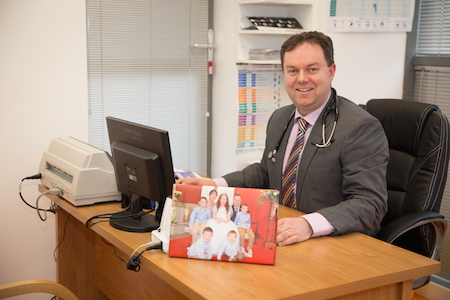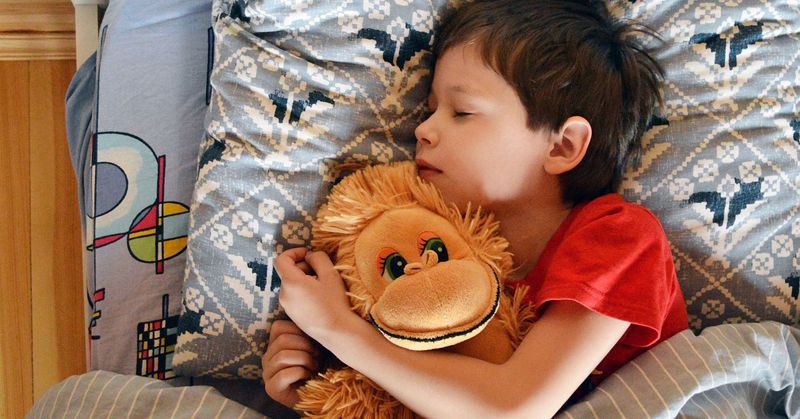This week Dr Ciarán Roarty of Scally McDaid Roarty Medical Practice looks at a common problem seen in children – bedwetting.

Dr Ciaran Roarty at the Scally McDaid Roarty surgery in Letterkenny.
Bedwetting or nocturnal enuresis, to give it the proper title, refers to a child passing urine during the night when they are sleeping. It is very common and up to 1 in 5 children aged 5 wet their beds at night. Although a lot of children are dry at night from a young age, it is actually considered normal in the medical world if a child wets the bed up to the age of 5.
What causes it?
Mostly there is no specific cause, and thankfully most parents now realise that it is definitely NOT the child’s fault. Basically the child’s body produces more urine than their little bladder can hold at night, and the full bladder sensation is not yet strong enough to wake them up. As they get older, the volume produced at night reduces and the sensation gets stronger so things usually resolve by themselves.
We do know that some things can make things worse. Stress can kick off a return of bedwetting when the child had previously been dry at night. Caffeine is a diuretic (it makes us produce more urine) so any foods or drinks with caffeine can be a problem – e.g. cola, tea, chocolate. Constipation may irritate the bladder and we often see bedwetting issues in children with chronic constipation. Being overweight is another risk factor and a family history of bedwetting will certainly increase the chances of it being a problem. Children with ADHD and developmental delay problems may also have an increased risk of bedwetting.
Thankfully other serious medical causes are rare and your doctor will likely out rule these with an examination and urine check. Bedwetting during the day may point to causes that require further investigation.
What can I do to help my child?
Patience, more patience and lots and lots of love! If a trial of stopping nappies doesn’t work, go back to night time pull ups or nappies for a while and try later. We do need to try night-time training by stopping nappies at night (or they will have little motivation to be dry) but if it doesn’t work at age 3, leave it a few months and then try again. There is a lot of variation in children with regard to when they become dry at night and your doctor will be unlikely to discuss any treatments below the age of 5. Remember they should not be punished for bed wetting – it’s not their fault, and keep an open mind to any stresses in your child’s life if they were dry and suddenly become wet again at night.
Explanation is important however, once your child is old enough to understand, and involve them in taking responsibility for changing sheets etc (even if it makes the whole process slower). Some parents have tried lifting their children during sleep, but this has not been shown to be helpful. Encourage the child to go to the toilet just before bed and if they wake during the night. You might leave a little night light and the bathroom light on to make it easy for them.
We should not restrict drinks during the day (even though you might think it should help) but rather it is better to only give drinks to your child in the 2-3 hours before bedtime if they are thirsty. If your child has constipation issues you should talk with your doctor. Practical measures such as waterproof bed covers and moisturising cream for your child’s skin to prevent any soreness are also useful.
Are there any treatments?
Often no treatment is used as things will mostly settle themselves. However other treatments that can be considered include a bedwetting alarm. They are often used in children from the age of 7 and work in about 2/3 of cases. They go off as soon as their child begins to get wet and prompts them to get up and to the bathroom. Gradually the child begins to wake with the full bladder before the alarm goes off.
Certain medicines are sometimes used to reduce the amount of urine produced at night. It is often given for a 3 month trial but unfortunately bedwetting may return when the medication is stopped. It can be useful for overnight trips away etc. Other medicines may be used by specialists but these can have side effects.
Reward systems help. The reward may be for going to the toilet just before bed, or getting up immediately once they notice they are wet or helping make the bed. A completely dry night may not be the main goal initially as mostly your child has no control over wetting the bed, but it may be used as a target when we notice things improving. Star charts are often helpful over a period of time.
The above information is intended as advice only and should you have any concerns please contact your own Doctor.
Dr Ciarán Roarty MB, BCh BAO MICGP DRCOG Grad. Cert. Obst. Ultrasound is a full-time GP at Scally McDaid Roarty Medical Practice, Scally Place, Letterkenny, Tel 0749164111 scallys.ie
Tags:







